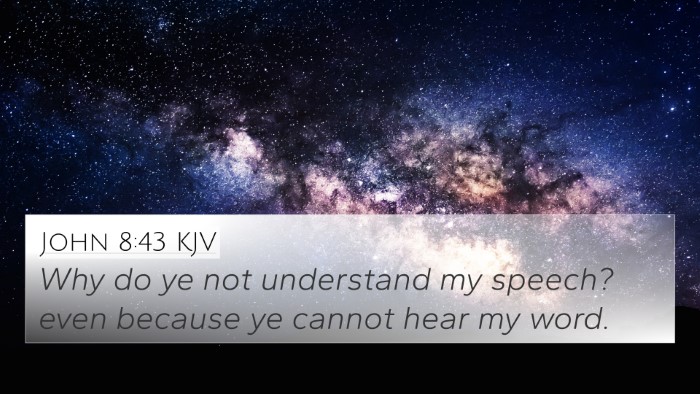Understanding John 8:47
John 8:47 states: "He who is of God hears the words of God; therefore you do not hear, because you are not of God." This verse is pivotal in understanding the relationship between God’s voice and the recognition of His truth by humanity.
Verse Meaning and Interpretation
This verse emphasizes two main points about the nature of those who belong to God:
- Discernment of God’s Voice: Those who are genuinely of God possess an inherent ability to recognize God’s words and teachings. It implies that believers have a spiritual sensitivity to divine truth.
- Spiritual Condition: In contrast, those who do not listen to God’s words are indicative of their not being in a true relationship with Him. Their inability to hear suggests a disconnection from God and His truth.
Commentary Insights
Insights from public domain commentaries shed light on this profound verse. Each provides unique perspectives on its implications:
Matthew Henry
Henry asserts that true believers are characterized by their affection for God’s word. He emphasizes that the inability to hear signifies a heart devoid of spiritual resonance with God. Henry extends this idea to underline the consequences of rejecting God’s voice, painting a stark picture of the spiritual blindness of those who do not belong to Him.
Albert Barnes
Barnes elaborates that the phrase “of God” implies a person’s origin and nature. He suggests that those who are regenerate by God’s spirit will inherently align themselves with God’s messages. He draws connections between obedience to God and a genuine reception of His words, making a case that spiritual life is dependent on this communication. Furthermore, he notes the implication that if one does not hear, it indicates a lack of divine relationship.
Adam Clarke
Clarke views this verse as a proclamation of divine authority. He emphasizes Jesus' position as the ultimate communicator of divine truth. Clarke posits that one’s response to God’s word is a litmus test for their spiritual standing, suggesting that the refusal to heed God’s word places individuals outside the flock of God. His interpretation underscores a critical aspect: divine fellowship is interlinked with the acknowledgment of His divine guidance.
Bible Cross-References
Understanding John 8:47 is enriched through various cross-references, highlighting connections between Scriptures:
- John 10:27: "My sheep hear my voice, and I know them, and they follow me."
- 1 John 4:6: "We are of God. He who knows God hears us; he who is not of God does not hear us."
- Romans 8:9: "But you are not in the flesh, but in the Spirit, if indeed the Spirit of God dwells in you."
- Matthew 7:24: “Therefore whoever hears these sayings of Mine, and does them, I will liken him to a wise man who built his house on the rock."
- Isaiah 30:21: "Your ears shall hear a word behind you, saying, 'This is the way, walk in it,'" - emphasizing the guidance available through God’s words.
- Proverbs 28:9: "One who turns away his ear from hearing the law, even his prayer is an abomination."
- Hebrews 3:15: "Today, if you will hear His voice, do not harden your hearts as in the rebellion."
Concluding Thoughts
The insights gained from John 8:47 affirm the significance of recognizing God's voice as a mark of belonging to Him. The interconnectedness of Scriptures through cross-referencing illuminates deeper truths regarding the believer's relationship with God. By engaging in cross-referencing Biblical texts, one can uncover thematic Bible verse connections that enhance understanding and foster spiritual growth.
Tools for Bible Cross-Referencing
Incorporating a Bible cross-reference guide can be indispensable for those studying Scripture:
- Bible concordance: Essential for finding verses related to specific themes.
- Cross-reference Bible study: Provides structured methods to explore connections.
- Bible reference resources: Aiding in deeper analysis and understanding of Scripture parallels.
- Identifying connections between Old and New Testament: Enriches faith and understanding.
Final Reflections
The path to understanding Scripture deeply involves studying Bible verses that relate to each other through careful comparative Bible verse analysis. By utilizing resources effectively, believers can cultivate a richer, more meaningful connection to God's word.
















